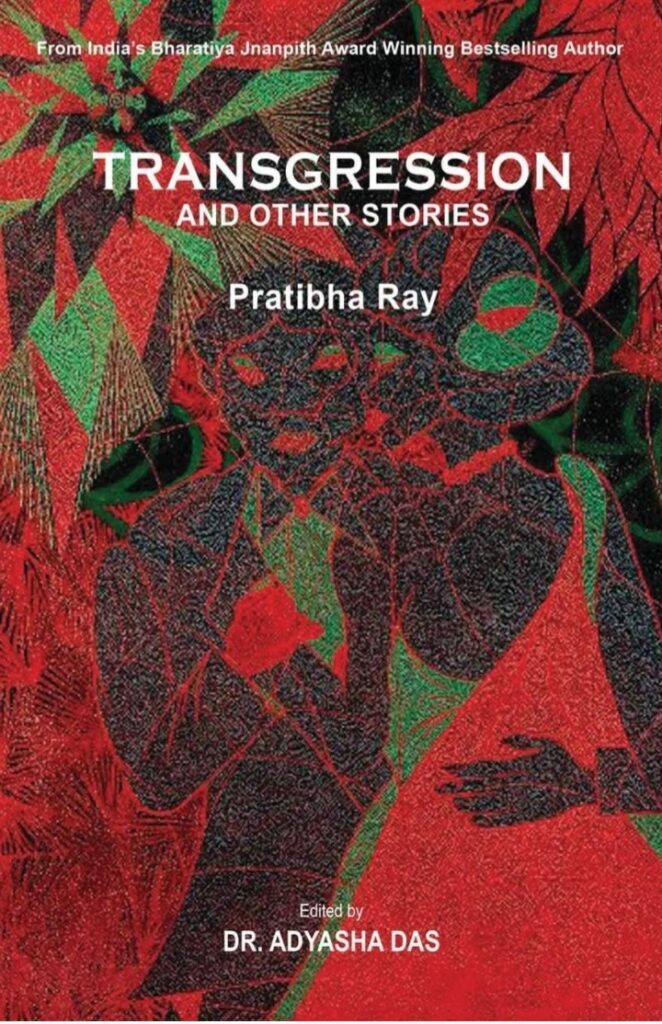A BOOK REVIEW BY TAMOHA MAJUMDAR
The short story as a narrative form is particularly effective in capturing the most complex human emotions with an economy of language. Pratibha Ray’s collection, Transgression and Other Stories masterfully achieves this through its descriptive storytelling which focuses on the lives of ordinary people, the society they live in and the ways in which they constantly negotiate with the societal norms. Like Rabindranath Tagore and Premchand, most of Ray’s stories deal with oppressed classes of the society and their struggles for existence. The stories exhibit a unique blend of tradition and modernity as it delves into the human psyche through a modern lens while retaining the cultural aspects rooted deep within the Indian society.
Edited by author and Ray’s daughter, Dr. Adyasha Das, the volume comprises of fifteen stories translated from Odia to English by various writers and scholars like the renowned award-winning poet Jayanta Mahapatra, Sachidananda Mohanty, Bikram K. Das, among others. Two of the stories, “Hunger” and “Animal Birth”, have been translated by Dr. Adyasha Das herself. Most of the stories typically represent the rural, village life, layered with rustic imagery. She would often put great sentimental value into unique but mundane objects and turn them into symbols of love, longing, guilt, and retribution.
While the stories in the collection primarily focus on socio-ethical themes, Ray does not try to preach what is right and wrong. Her narrative style is observational yet deeply personal at the same time. While stories like “The Blanket”, “Adoration”, “The Little Carved Box” and “The Mango Tree” explore the feelings of loss and grief by highlighting the ways in which human interpersonal relationships are powerfully entwined in Indian culture and society, stories like “The Stigma”, “The Other God” and “The Untouchable God” critique the various structures of inequality that exist in the same society.
Ray draws out her characters’ emotions and communicates it so organically that one cannot easily dismiss a morally problematic character as simply ‘evil’. She intentionally blurs the line between good and evil and provides a more humanistic approach when it comes to understanding a character’s action. The story “Transgression” deals with the complexities of expressing and suppressing carnal desires and its consequences. She unabashedly confronts the primal, instinctive, and dark side of the human mind without passing a value judgement, almost reminiscent of the short stories of Manto and Manik Bandopadhyay. For example, in the story “Hunger”, Ray tries to show us the lengths till which a hungry, starved mother can go in order to stay alive while subtly commenting on the unequal gender structures that govern the world.
The subject of gender inequality recurs in most of the stories. Ray critiques the underlying structures of patriarchy inherent in our culture. “The Stigma” and “The Curse” talk about female desire and sexuality and depicts the ways in which a woman’s sexuality is curbed by a male-dominated world as she writes:
“Society is cruel to women. Like cattle, girls are given away to old men against their wishes. Why? Don’t women have minds? Are they all body and no mind? Have they been made only to eat, work and bear children?” (Ray 65)
Her women characters in the stories appear always deeply misunderstood by the people most close to them. Burdened by the many responsibilities of being a mother, or a wife, or a daughter-in-law, she often loses herself in the loneliness that envelopes her. Such thoughtful portrayal of the plight of being a woman is undoubtedly a reflection of the world we live in and Pratibha Ray captures these experiences with great compassion:
‘It is my opinion that for girls “my house” is more important than “my husband”. Woman just love being in charge of a house. They may not like the husband chosen for them but get along with their lives, concentrating all their attention on “my home”. They may not be free to choose their husbands but when it comes to setting up a home, they are in full control.’ (Ray 79)
It is not only the inequality of gender that she addresses but also other social inequalities that are prevalent in Odia society. The story “Animal Birth” revolves around the Bonda tribe and their ways of life. Ray has worked for and written extensively on Bonda people, an ethnic group that resides in the hills of Odisha. Through this story, she has tried to shed light on the culture and daily struggles of the Bonda people who suffer negligence and discrimination from the government and dominant communities of Odisha. She depicts their humanness without over-sentimentalism while accepting the reality of their ‘different’ culture.
Such diverse array of characters is brought together in this volume but all of them do not seem very different from each other, haunted by a common feeling of helplessness. The English translation manages to preserve Ray’s authentic representation of its characters without compromising the aesthetic of the target language. The choice of keeping colloquial words of the source language in the translation, contributes to a more culturally enriched experience for the readers.
Translation is a linguistic process as well as a cultural process. Translations of regional language literature into English and other Indian languages ensure that the source language and its cultural heritage reaches a wider and more diverse set of readers, national as well as international. Odia literature has been neglected for a long time in comparison to other bhasha literatures. Therefore, this translated volume shows a significant effort to achieve cultural diversity as Ray’s stories have immense potential to represent Odia literature to a global audience.
References
Ray, Pratibha. Transgression and Other Stories, edited by Dr. Adyasha Das. Black Eagle Books. 2020, pp 65, 79.
Also, read Suspected Poems Book Review by Shubha Sundar Ghosh published in The Antonym
Follow The Antonym’s Facebook page and Instagram account for more content and exciting updates.



























0 Comments